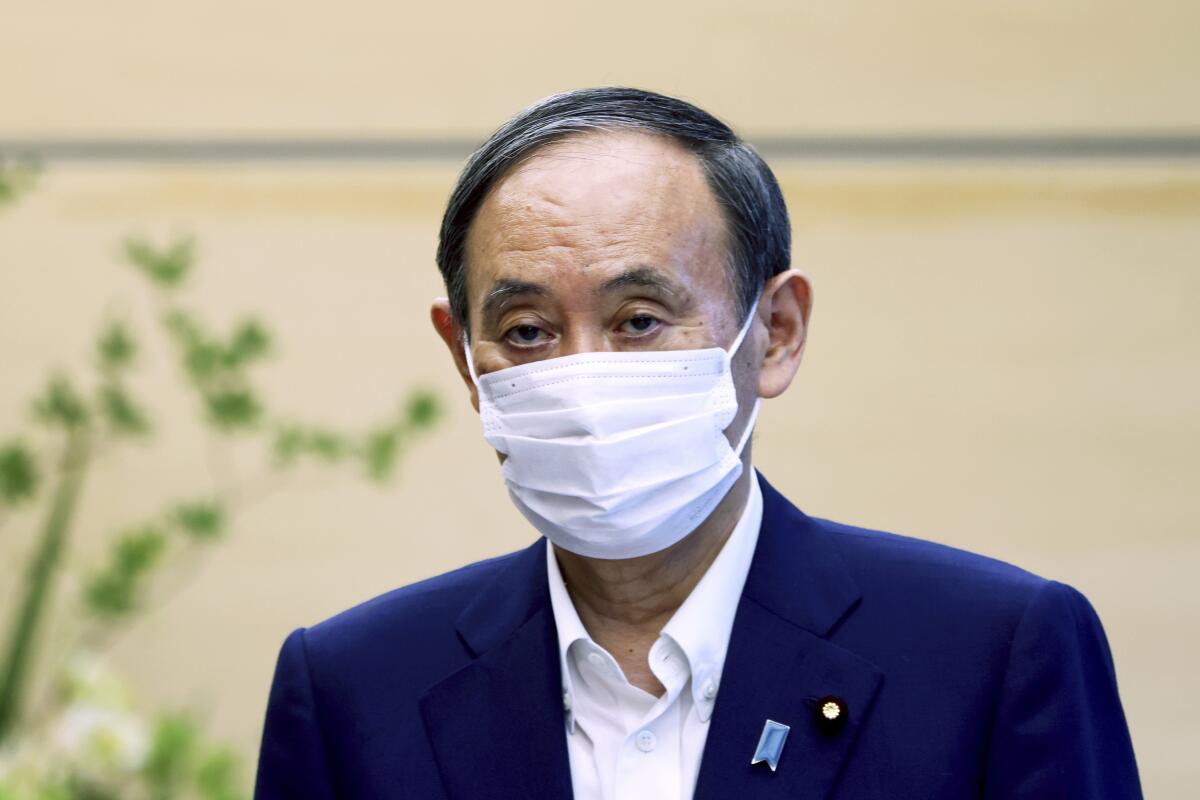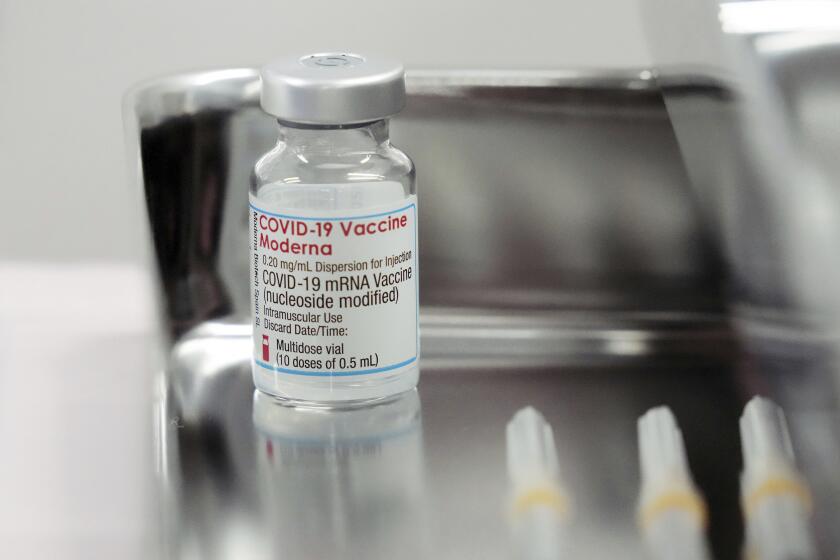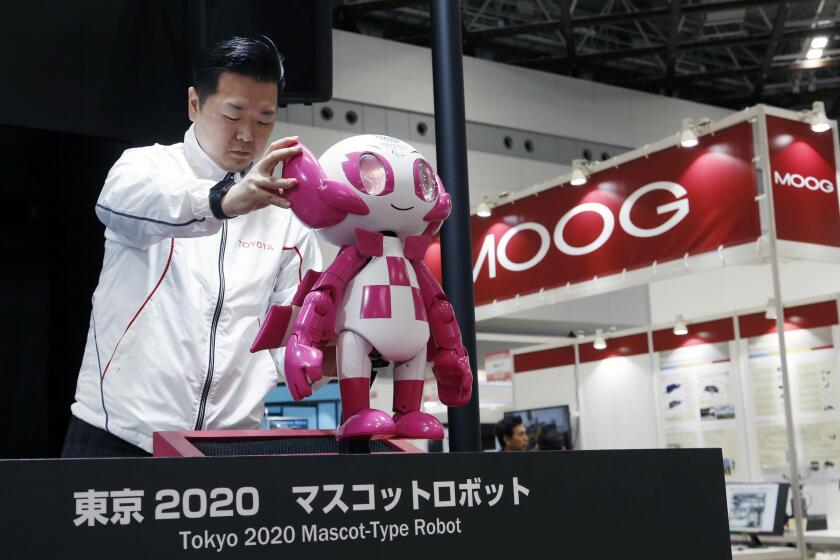Japan’s Suga is stepping down as prime minister after less than a year in office

- Share via
TOKYO — Amid growing criticism of his handling of the COVID-19 pandemic, Japanese Prime Minister Yoshihide Suga said Friday that he would not run for the leadership of his ruling party later this month, paving the way for a new premier after just a year in office.
Suga said that leading Japan’s pandemic response and campaigning to remain leader of the Liberal Democratic Party at the same time divided his energies. “I have decided not to run for the party leadership elections, as I would like to focus on coronavirus measures,” Suga told reporters who rushed to his office after the news broke.
Suga has faced criticism and nosediving public support over a coronavirus response seen as slow and inadequate and over his insistence on holding the Tokyo Olympics despite the public’s health concerns. His hopes that Olympic festivities would help turn around his plunging popularity were dashed. He said he had put all his energy into important issues, including the coronavirus response, since taking office.
“As I have repeatedly told people, protecting people’s lives and health is my responsibility as prime minister, and that’s what I will dedicate myself to,” he said.
His party holds a majority in parliament, meaning that whoever wins the Sept. 29 party leadership vote automatically becomes prime minister under normal circumstances.
The official start of the leadership campaign is Sept. 17, and a few potential candidates have said they intend to run. Candidacy requires factional support largely controlled by party heavyweights, and their choices may not match those favored in public opinion surveys.
Japan’s suspension of 1.63 million Moderna COVID-19 vaccine doses over contamination concerns comes as the country grapples with a coronavirus surge.
Two potential candidates are former Cabinet ministers in former Prime Minister Shinzo Abe’s government: dovish former Foreign Minister Fumio Kishida, currently seen as a top contender, and former Interior Minister Sanae Takaichi, who shares Abe’s right-wing ideology.
Vaccinations Minister Taro Kono also expressed interest Friday, saying he would make a final decision after consulting fellow lawmakers. Former Defense Minister Shigeru Ishiba, a favorite in media surveys, and Seiko Noda, former gender-equality minister, also reportedly have expressed intentions to run.
Kishida has criticized Suga’s handling of the pandemic and recently proposed a series of coronavirus response measures, including more funding, a pledge to secure more hospital beds and creation of a health-crisis management agency to centralize pandemic response measures.
Kono, the son of the longest-serving speaker of the lower house and grandson of a former deputy prime minister, is a political blue-blood and has served as foreign and defense minister. He regularly communicates on social media and is popular among younger voters.
Olympic visitors will likely remember not technological advances but the reams of paper forms, glitchy apps and rigid bureaucracy of Japan’s anti-COVID measures.
Suga’s decision is largely being seen as a tactical move for the Liberal Democratic Party to have a fresh leader before national elections later this year. The lower house’s term ends in late October, and elections for a new parliament must be held by late November.
Suga took office in mid-September a year ago to fill out the rest of Abe’s three-year term after Abe resigned because of health problems.
The son of a strawberry farmer from Japan’s northern prefecture of Akita, Suga enjoyed approval ratings of as high as 70% early in his tenure because of his reputation as a leader who sprang from common folk rather than from a blue-blooded political family like Abe’s.
Suga introduced a series of pragmatic measures including digital transformation and administrative reforms, but his approval ratings slid quickly over his coronavirus measures, which were seen as too slow and too small to prevent growing outbreaks.
Start your day right
Sign up for Essential California for the L.A. Times biggest news, features and recommendations in your inbox six days a week.
You may occasionally receive promotional content from the Los Angeles Times.
His fall from grace accelerated late last year when he bumbled a travel promotion campaign as the pandemic was worsening. He was forced to declare a state of emergency in January and has since repeatedly expanded and extended the emergency measures, most recently until Sept. 12. In the latest surveys, his approval ratings have declined to about 26%.
“Being forced to live under restrictions, people have become increasingly frustrated and their dissatisfaction is nearing its peak, and that’s the biggest reason causing Suga’s administration to end,” the Mainichi newspaper commented.
The state of emergency has largely focused on requests for eateries to close early and not serve alcohol, while requests for people to stay home and maintain social distance have largely been ignored.
Suga has been criticized for presenting an overly optimistic outlook on the pandemic and for not conveying the gravity of the crisis. Japan’s vaccination campaign rollout also had a slow start.
Although the pace of new coronavirus cases in Tokyo has slowed somewhat, experts say a resurgence could happen any time, and the healthcare system is under severe pressure, with hospitals full of seriously ill patients and tens of thousands of sick people recovering at home.
More to Read
Sign up for Essential California
The most important California stories and recommendations in your inbox every morning.
You may occasionally receive promotional content from the Los Angeles Times.











